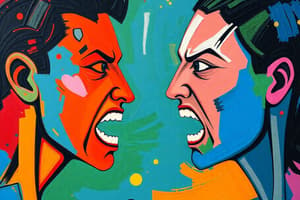Podcast
Questions and Answers
What does the Mood Management Theory suggest about individuals' media choices?
What does the Mood Management Theory suggest about individuals' media choices?
- People avoid media when they feel depressed.
- Content is selected to enhance mood or maintain emotional balance. (correct)
- Media choices are determined by social influences.
- Individuals choose media solely based on popularity.
What was a significant finding regarding the control group in the study on violent video games?
What was a significant finding regarding the control group in the study on violent video games?
- They showed higher aggression than other groups.
- They exhibited the lowest aggression levels. (correct)
- Their aggression levels were similar to the experimental groups.
- They had a higher incidence of hostile feelings.
What limitation of the study affects the ability to draw causal conclusions about violent video games?
What limitation of the study affects the ability to draw causal conclusions about violent video games?
- The absence of long-term effects measured.
- The lack of diverse participants.
- The quasi-study design that only measures correlation. (correct)
- The small sample size.
Which aspect of violent video games was found to potentially help players, according to follow-up research?
Which aspect of violent video games was found to potentially help players, according to follow-up research?
What conclusion can be drawn about violent video games according to the provided research findings?
What conclusion can be drawn about violent video games according to the provided research findings?
What effect does watching violent media have on emotional responses to real-life violence?
What effect does watching violent media have on emotional responses to real-life violence?
According to schema theory, why might alcohol increase aggression during social interactions?
According to schema theory, why might alcohol increase aggression during social interactions?
How does exposure to violent television shows impact children's aggression towards friends?
How does exposure to violent television shows impact children's aggression towards friends?
What was the correlation found in Eron's 1982 study regarding teenagers and violent shows?
What was the correlation found in Eron's 1982 study regarding teenagers and violent shows?
Which of the following best describes the impact of alcohol on social behavior according to the information provided?
Which of the following best describes the impact of alcohol on social behavior according to the information provided?
What phenomenon occurs when individuals become less sensitive to violent events after repeated exposure to violence in media?
What phenomenon occurs when individuals become less sensitive to violent events after repeated exposure to violence in media?
What is a conclusion drawn from Brown et al. 2011 regarding alcohol exposure in adolescents?
What is a conclusion drawn from Brown et al. 2011 regarding alcohol exposure in adolescents?
What is the Catharsis Hypothesis in the context of aggression?
What is the Catharsis Hypothesis in the context of aggression?
What is a potential outcome of being frequently exposed to violent media according to the desensitization theory?
What is a potential outcome of being frequently exposed to violent media according to the desensitization theory?
Which theory suggests that individuals learn behaviors through observing others?
Which theory suggests that individuals learn behaviors through observing others?
According to the Catharsis Hypothesis, how does engaging with violent media like video games benefit individuals?
According to the Catharsis Hypothesis, how does engaging with violent media like video games benefit individuals?
What is a criticism of existing evidence supporting the Social Learning Theory in relation to violent video games?
What is a criticism of existing evidence supporting the Social Learning Theory in relation to violent video games?
What did the study conclude regarding the impact of previous experience with violent video games?
What did the study conclude regarding the impact of previous experience with violent video games?
What is a proposed function of violent video games according to the Catharsis Hypothesis?
What is a proposed function of violent video games according to the Catharsis Hypothesis?
What did the Hitman study reveal about aggressive behavior in participants exposed to violent video games?
What did the Hitman study reveal about aggressive behavior in participants exposed to violent video games?
Which of the following statements accurately reflects the findings about the Catharsis Hypothesis?
Which of the following statements accurately reflects the findings about the Catharsis Hypothesis?
Flashcards
Social Learning Theory
Social Learning Theory
People learn by observing others, especially through imitation and reinforcement. Violent media can create violent scripts acted out in real life.
Catharsis Hypothesis
Catharsis Hypothesis
Expressing emotions (like aggression) releases pent-up feelings, reducing future aggression.
Video Game Violence Study (Ferguson & Rueda)
Video Game Violence Study (Ferguson & Rueda)
A study that found no significant difference in aggression between video game players and controls.
BoBo Doll Study
BoBo Doll Study
Signup and view all the flashcards
Video game violence
Video game violence
Signup and view all the flashcards
Aggressive Behavior
Aggressive Behavior
Signup and view all the flashcards
Mixed Evidence
Mixed Evidence
Signup and view all the flashcards
Publication Bias
Publication Bias
Signup and view all the flashcards
Mood Management Theory
Mood Management Theory
Signup and view all the flashcards
Video games effect on aggression
Video games effect on aggression
Signup and view all the flashcards
Control group aggression
Control group aggression
Signup and view all the flashcards
Causation vs. Correlation
Causation vs. Correlation
Signup and view all the flashcards
Study Limitations
Study Limitations
Signup and view all the flashcards
Hostile Attribution Bias and Aggression
Hostile Attribution Bias and Aggression
Signup and view all the flashcards
Alcohol's Disinhibitory Effect
Alcohol's Disinhibitory Effect
Signup and view all the flashcards
Alcohol's Impact on Self-Control
Alcohol's Impact on Self-Control
Signup and view all the flashcards
Alcohol-Aggression Schema
Alcohol-Aggression Schema
Signup and view all the flashcards
Media Violence and Aggression Correlation
Media Violence and Aggression Correlation
Signup and view all the flashcards
Media Violence Desensitization
Media Violence Desensitization
Signup and view all the flashcards
Media Violence and Aggression: Conditioning
Media Violence and Aggression: Conditioning
Signup and view all the flashcards
Media Violence and Arousal Decline
Media Violence and Arousal Decline
Signup and view all the flashcards
Study Notes
Aggression and Violence
- Aggression is any behavior—physical, verbal, or relational—intended to harm someone unwilling to be harmed.
- Features of aggressive behavior:
- It's observable action, not an internal response.
- It's intentional, not accidental.
- The victim wants to avoid harm.
- It may or may not achieve its goal.
- The intention is to harm another person intentionally.
- Examples of aggression:
- Danny telling a coworker that Sarah is stealing printer ink.
- Tristan punching someone in a club, missing the target.
- Susie kicking her partner under a dinner table.
Violence
- Violence is aggression intended to cause extreme physical harm, serious injury, or death.
Frustration-Aggression Theory 1
- The theory posits that aggressive behavior is always caused by frustration.
- Frustration always leads to aggression.
- Frustration occurs when a person is prevented from achieving a goal.
- Limitations include ignoring other causes of aggression (e.g., fatigue, stress).
Reformulated Frustration-Aggression Model 2
- Frustration creates aggressive inclinations only when it produces a negative emotional response.
- Frustration and other discomforts lead to aggression if they:
- Prompt negative feelings.
- Prompt aggressive inclinations.
- Frustration doesn't automatically cause aggression
Negative Affect and Aggression
- Aggression stems from negative emotional reactions (affect) associated with frustration.
- Unintentional or meaningless frustration may reduce the likelihood of aggression.
- Anticipation of negative outcomes can reduce feelings of frustration.
Expectation and Aggression
- Understanding potential failure can lessen frustration, negative affect, and aggression.
- The closer one is to a desired outcome at the point of failure, the greater the resulting frustration, negative feeling, and aggression.
Factors Influencing Aggression
- Factors that may influence or contribute to aggression include:
- Personality
- Mood
- Gender
- Culture
- Cognitive biases
- Alcohol
- Media
Social Norms and Aggression
- Social norms influence aggressive behavior.
- Consequences play a role in preventing aggression.
- Target Attributions: Men feel aggressive more than women, and are more likely to act aggressively.
- Victim Attributions: People are more aggressive against those of the same sex and age.
Gender and Aggression
- Unprovoked men tend to be more aggressive than unprovoked women.
- Emotional arousal in men may heighten aggression more than in women.
- Men often engage in physically aggressive acts more than women.
- Women may exhibit indirect aggression more than men.
- No significant difference in verbal aggression between genders.
Culture and Aggression
- Culture plays a role in aggression.
- People in honor cultures feel obligated to defend their reputations.
- Various subgroups or cultures display different norms and views around honor culture.
- Cultures often differ on use and perception of violence.
Culture of Honor
- An honor culture is a societal group where individuals feel obligated to protect their reputation from insults, threats and violence toward others.
- Honor cultures exist in:
- America
- Southern American
- Inner cities
- Middle East
- Jails
- Mafia
- Action Movies
- Honor cultures develop due to:
- Lack of authority
- Lack of effective law enforcement
- Situations where people need to protect themselves
Culture of Honor and Aggression
- Some research suggests that cultures of honor are linked to higher levels of aggression.
- The perception of injustice and reputation can motivate aggressive behavior.
- Certain aspects of culture influence how and when people respond to potentially hostile situations.
- Research shows that implicit social stereotypes can influence how people respond when frustrated.
Violence and Self-Protection
- Violence that is used to protect oneself or others can be viewed as justifiable.
- This aligns with certain cultural expectations around defending oneself.
Results of Studies and Hormones
- Testosterone increases aggressive responses and anticipation of aggression in individuals.
- Insults can have a more impactful effect on honor in groups with specific cultural norms.
- Men in honor cultures might respond aggressively to protect their reputation or masculinity.
- Honor cultures are associated with an increased risk of war and conflict.
- A study indicates that American presidents from the southern U.S. are more likely to use military force and engage in conflict.
Cognitive Biases and Aggression
- Hostile attribution bias is the tendency to interpret ambiguous actions by others as hostile.
- A consistently high hostile attribution style relates to aggression, stemming from early experiences.
- It influences how individuals perceive events and others.
Alcohol and Aggression
- Alcohol is used to reduce anxiety or increase aggression.
- Alcohol can increase the likelihood of violent crime.
Media and Aggression
- Exposure to violent media (TV, video games) can desensitize individuals to violence and increase aggressive behavior in individuals.
- Exposure to displays of violence can diminish emotional responses to violence.
Video Game Violence
- Learning via observation can lead to imitation of aggressive behaviors seen in media (like video games).
- Violent video games might not necessarily cause aggression, as other factors influence whether or not someone will behave aggressively.
Mood Management and Aggression
- Individuals can choose media content to manage and improve their moods.
- Violent or dark media might be chosen to cope with stress or depression.
- Studies might not show a decrease in hostile feelings after engaging with violent video content.
Limitations of Studies
- Quasi-studies find correlations, but not causation between variables.
- Sample sizes might not be large or representative.
- Experimental setups may not adequately replicate real-world frustration levels impacting aggression.
Studying That Suits You
Use AI to generate personalized quizzes and flashcards to suit your learning preferences.




